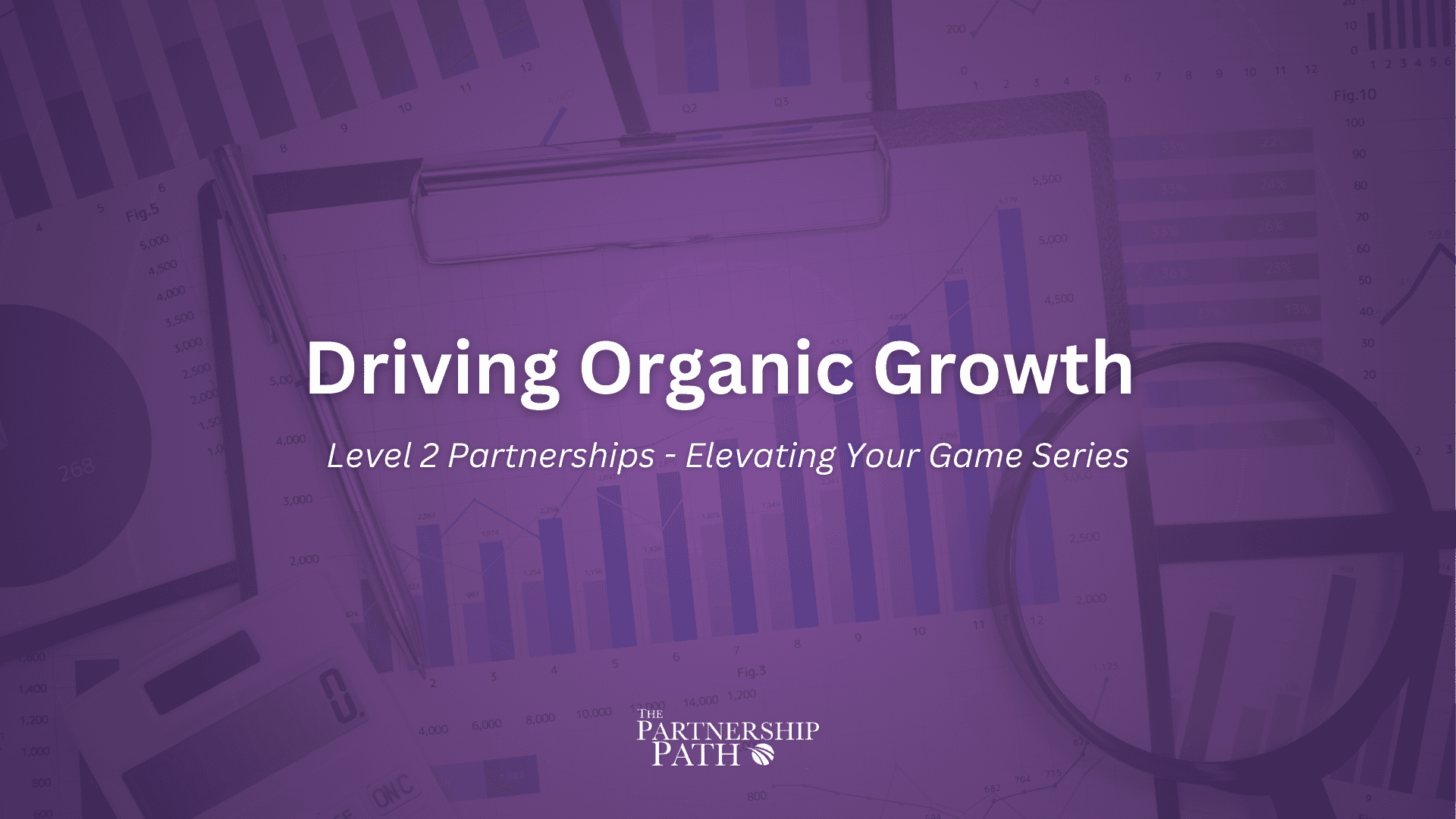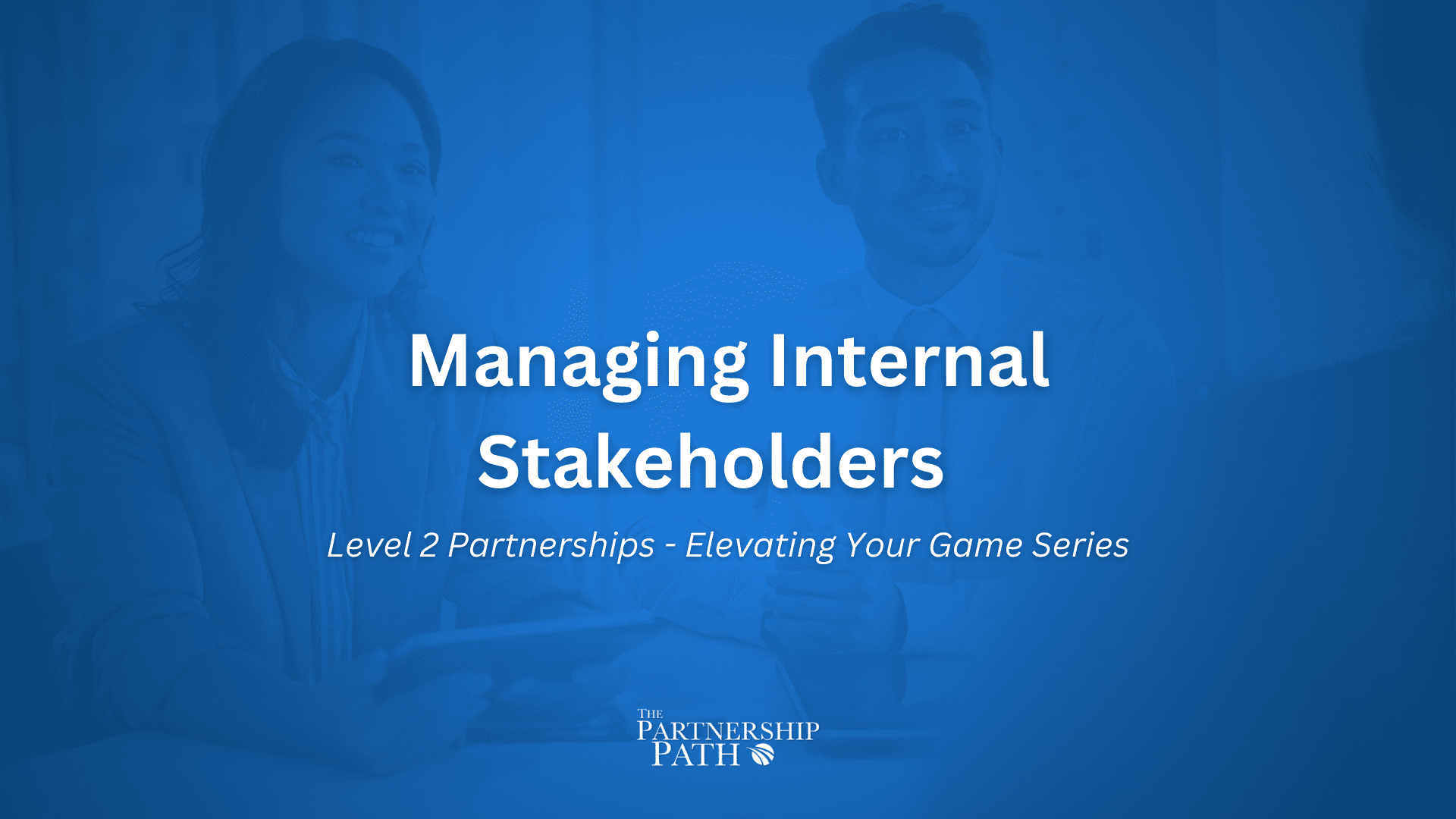IRL Episode
Driving Organic Growth with Alessia Ippona at Infor
Episode Summary
In this episode of The Partnership Path in Real Life, John Rudow dives deep with channel manager Alessia Ippona to explore how partnerships can evolve and thrive in a competitive landscape. With a rich background in sales and business development, Alessia shares her expertise on leveraging relationships and embracing change for organic growth.
This conversation is packed with valuable insights for anyone involved in channel partnerships, highlighting the importance of mutual goals and strategic planning. I believe sharing this video is crucial because it offers actionable advice on navigating the complexities of partner relationships and achieving sustainable growth in today’s dynamic market.
Transcript
John (00:01)
Well, hello everybody and welcome to another episode of the Partnership Path in Real Life. I’m so excited to have Alessia on the show with us today. And before we go anywhere, Alessia, I want to give you an opportunity to introduce yourself to our listeners. Tell us a little bit about who you are, what you do, and how long you’ve been working with partners.
Alessia (00:21)
Hi John, thank you very much for your introduction and for inviting me to this very exciting episode. I have been working with partners for four years now and I work in a software vendor based in US that is called Infor and I am currently channel manager at Infor, so working with partners. I’m based in Italy and I follow the Italian territory.
John (00:50)
love it. So not working with partners for a really long time, what were you doing before you worked with partners?
Alessia (00:58)
that’s an interesting question. I have worked as account executive for so many years and also in business development for some years. So I really have a background in sales and I experienced this shift from direct account executive to channel managers working with partners. It seems a very similar job and it is, but it’s not the same.
John (01:00)
You
Okay. Yeah.
Yeah.
Alessia (01:27)
It’s a really different type of job.
John (01:27)
Yeah.
Yeah. I love that you just said that because I am a, that’s my whole thing. I actually have a direct sales background as well and then got into this partner thing. And it’s fascinating to me because I think a lot of people who aren’t, haven’t seen both sides think that it’s essentially kind of the same job. And there are a lot of similarities, but
Man, there’s stuff in the partner side that is different enough that it requires a whole different kind of approach. You get to leverage some of your sales background, but it’s not the same. It is definitely different. So I love your background. I think that’s a perfect background for you to be super effective as a channel manager.
Alessia (02:15)
I totally agree and I believe one of the main shifts that you need to do is to always remember that when you work with partners you are in a partnership. So you cannot just think about
John (02:26)
Yeah.
Alessia (02:28)
your company and your interests and your goals, but you need to remember that you’re working with another company, different goals, different metrics, different people, and you always need to think about being beneficial for both and for the partnership. Otherwise, it will not work.
John (02:32)
That’s right.
That is exactly right.
That’s right. That is, man, that’s gold right there. I want to just take that. I’m going to make a commercial out of that, Alessio. I love that. All right. So listen, we’re here on this episode today to talk about organic growth with our partners. How do we help our partners get bigger or our partnership to get bigger by doing new and different things? And so I know you just listened to the episode that Tony and I did on this. And so let me just start with
Alessia (02:55)
Okay.
John (03:17)
kind of opening it up for you and saying, hey, what did you think of that episode? What resonated for you and what really stood out for you when we were talking about that?
Alessia (03:29)
Yes, at least to the episode and I think this is very interesting and I want to point out a couple of topics that I think are really interesting. The first one is we all want to grow. My company wants to grow, the partner wants to grow. But before going into this grow, how do we want to The first question is, are we in the condition where we can grow?
So analyzing where the partner is and the efficiency of all the different areas that are contributing, that should contribute to this growth, it’s a key because we should first evaluate, I don’t know, sales, marketing and lead generation or deployment or operations and so on. If all these areas are efficient, optimized or at least…
John (03:55)
Yeah.
Alessia (04:22)
works, work in a functional way, then we can think about grow because we are doing good and we should think about how can we do better, sell more and grow. But if some areas are not really working well, maybe we should consider to start from making understanding how we can make these areas operate better so then we are ready to grow.
John (04:47)
Yeah, one of my favorite things, Alessia, I think that in so many cases, we have partner organizations who, like you said, want to grow. But the truth is, is that their operation isn’t mature enough yet to grow. And so we have to address that first. We have to help them get to a healthy place so that they can grow. So super critical. Love that. What else?
Alessia (05:13)
Because
growing means effort. And when we put our effort into something, we should first try to evaluate if our effort would be rewarded enough. And the second topic I wanted to point out that you mentioned during the episode is that at a certain point, we need to sell it to our partners. That’s very nice.
John (05:28)
Yeah. Yeah.
Yes!
Alessia (05:43)
And that’s very true because as I mentioned at the beginning, we need to remember that we are in a partnership, so we have another company involved and we need to keep our focus on that. And if we want to grow in a certain way or to reach certain results and we think it’s feasible, but we also need to…
evangelism, I mean, we need to sell it to the partner and make our stakeholders release our sponsors in in the growth we want to have.
John (06:11)
Yeah?
Yeah.
Yeah. And this is where your sales background really comes into play, right? It is so much of what you’re doing is selling the partner on the idea of growing in a particular way. And much like when you’re selling something to a customer, whatever it is that you’re selling them, the idea you’re selling them on actually has to make sense for them. Like you can’t…
Alessia (06:21)
Ha ha!
John (06:41)
convince a partner to do something that makes no sense, to sell into a market they have no expertise in, or to sell a product they have absolutely no experience with, or whatever, right? I mean, it is a sales job, but it also has to be like something that makes sense for them, which means you have to actually know your partner.
Alessia (07:00)
Yes, yes, you are right. evangelism is the first. So we need to create also like an excitement. It’s very exciting to do this together. So this is the selling part. Then we also need to educate. OK, we are all excited. What should we do to get there? We need the unit training. Do you need maybe training? If you have employment consultants, you need to train consultants or maybe you need to.
I have a new marketing campaign with different metrics or different. So we also have to educate and then do not remember that after all we need to put all of these in place. So not just talking, but also doing the things we need to do to grow.
John (07:43)
Yeah. Yeah. I’m curious. You one of the things we try and do on these episodes, Alessia, is really give super practical kind of tactical advice. So when you talk about having to sell the partner on the idea of growing in a certain way, what are some of your, what’s some of your advice to someone out there who’s got to do that? Like, how do you approach that? Do you, is it, is it just a meeting and a discussion? Do you,
do a lot of research beforehand. Like what does that look like for you?
Alessia (08:18)
I think it really depends on what we are talking about. And I can give you an example. I mentioned at the beginning that I’m working for a software vendor. And that’s right. We do applications for companies, enterprise applications. But during the last years, we also have a focus on innovation and technology, RPA, artificial intelligence, GenAI, and all these type of things.
that it’s it’s let’s say like new product, but it’s also a little bit different than what we usually do. And we want to engage our partners on this, just like an upsell to existing customers, but we also can go to possibly to new customers. we need to, first of all, I think we don’t need to…
take it for granted that our partners are interested in going where our company wants to go, first of all. So we need to remember, we need to evangelism. So go there and explain the new direction that we are taking and if we want them to be part of it and then try to explain what market opportunities we can have. We can have new selling, we can make money.
John (09:17)
Yeah. Yep.
Alessia (09:42)
and we really have the mark. We should explain that the market is going in that direction. We are following the market and it’s plenty of opportunities we can try to reach. we do it, yes, I did my some marketing opportunities, some market. I mean, I.
investigated market, but in this case I’m a little bit also lucky because as our company is going in this direction, we also have a lot of marketing material and strategy material that we can use with partners.
John (10:17)
Yeah. So when you have all that ready, how do you do that with the partner? What does that really look like, right? Are you bringing in the most senior level people in the partner and just sitting down and having a conversation with them? Is it a more formal presentation that you make to them? Like, how do you evangelize?
Alessia (10:43)
But don’t forget competitive mindshare. also try to, through our stakeholders or the people that we are more in touch with at the partner site, try to investigate if the partner, so not just the partnership, the people we usually talk to, but the whole company that can be a lot bigger.
if they already have a practice in this area or if they are developing something internally or if they are talking to other software vendors that can provide. So first of all, try to investigate this or using the information that the people you usually work with can give you. And then I think that it depends. Sometimes you can talk to the same people
of your partnership, but sometimes you need to reach to other people because there can be different business units with different stakeholders that should be involved in the conversation. So I think that the stakeholders that you usually work with should become like a champion, a sponsor to try to bring you to the right people in their company and also maybe to top management if needed, but they can
If you do the right job with them and you convince them that’s an opportunity for their company, they will bring you to the right people.
John (12:14)
Yeah. Which sounds like you just described a sales cycle, essentially. Yeah. It’s pretty, pretty similar. But selling to the partner instead of selling to the customer. I love that. What are one of the other things I think probably our listeners would be curious in curious about in this is what are some of the kinds of pushback that you get? What are the types of things that partners are often?
Alessia (12:19)
You’re right. You’re right.
John (12:42)
pushing back against when you’re doing that and how do you overcome some of that?
Alessia (12:49)
and
Sometimes if you have a long partnership with a company and you have always been focused on a product or a single product or a single industry, it’s not easy to try to think the partnership in a bigger way. So we have always done in a different way. Why should we do it? That’s the first pushback we get.
John (13:11)
Yeah.
Yeah.
Yeah, yeah, that’s a hard one, right? And I think in some ways that goes back to your original point of are they even capable of growing, right? Because if their own mentality is we don’t really want to change, we want to grow, but we don’t want to change. Like, are they even able to grow then, right? That’s got to be a tough question.
Alessia (13:45)
You know, growing with new products, new industries, it’s an effort. Bigger or smaller, but it’s an effort. For example, they need to train themselves, stakeholders, maybe hire people or identify some people that should be trained on the new.
technology or the new industry and find the time to do it because sometimes they are really full with day by day business.
John (14:24)
Yeah, yeah, could be. mean, look, when you’re running a small business, it’s easy to get pretty busy and get, you know, too busy to do some of the things that are necessary for growth. I get that. All right. Well, listen, Alessia, we try and keep these episodes relatively short so that people can listen to this in their car or whatever. And so we’re almost at time. Is there anything else, any other advice that you have for other
channel managers or partner account managers out there who are trying to get their partners to grow. Any last words of advice from somebody who’s doing it every day?
Alessia (15:02)
Something we already said during the episode, but as channel managers, we are a limited resource. We have a limited time. We have a limited capacity. So growing requires a lot of effort. So I think it’s better to think a little bit more on where we want to focus our time and our effort to identify the partnerships
John (15:13)
Yeah.
Alessia (15:32)
that can really grow and how we can make these partnerships grow, which strategy is the best one. To reach, after all, to reach our goal and our targets that everyone has, of course.
John (15:41)
Yeah. So.
Yeah.
Super on target there, Alessia. Again, I can hear your sales background coming through, right? Like this is what we talk about as salespeople too, right? If you’ve got a pipeline of opportunities, you have to pick the right opportunities to invest in that you believe you can win. And this is exactly the same thing, right? If you’re going to try and grow partners in your portfolio, you got to pick the right ones.
Alessia (15:57)
You
John (16:14)
And you need to really spend the time thinking about which are the ones that are worth investing in that I’ll get that return from. I’ll get that growth return 100 % on target. Alessia, thank you so much for coming on an episode with us. I really appreciate your insights and appreciate you sharing some of that with our listening community. And I hope you’ll join us again on another episode sometime soon.
Alessia (16:24)
you.
Thank you very much for this opportunity. It was lovely to speak with you about that.
John (16:43)
Thanks, Alessia.
Alessia (16:45)
Thank you, bye bye.
Key Takeaways
- Evaluate Partner Readiness: Understand if the partner’s operations are mature enough to support growth before pursuing new initiatives.
- Evangelize Change: Effectively communicate the potential benefits of new opportunities to partner stakeholders to drive buy-in and enthusiasm.
- Invest Wisely: Be selective about which partnerships to devote resources to, focusing on those that align with strategic growth goals.



